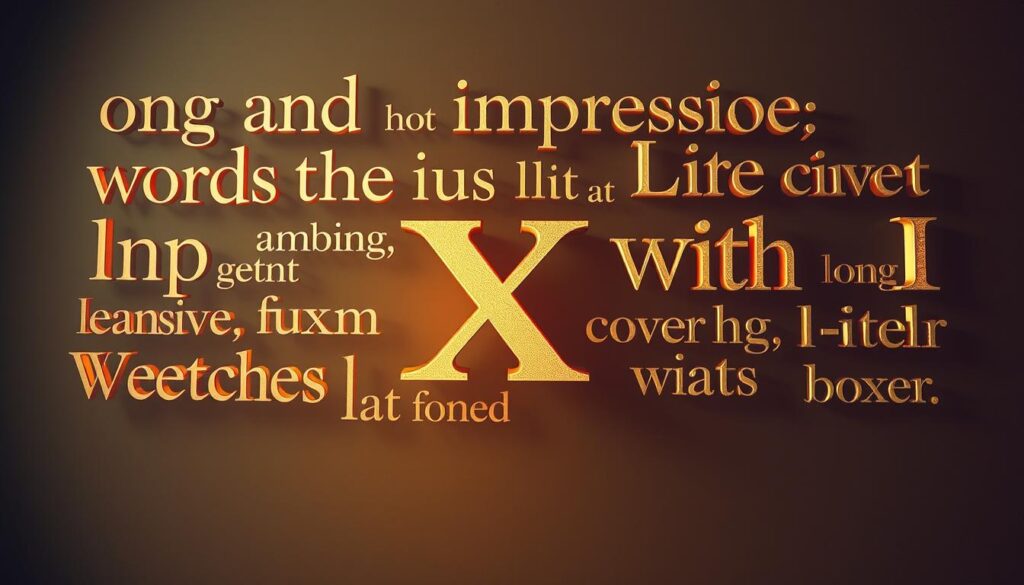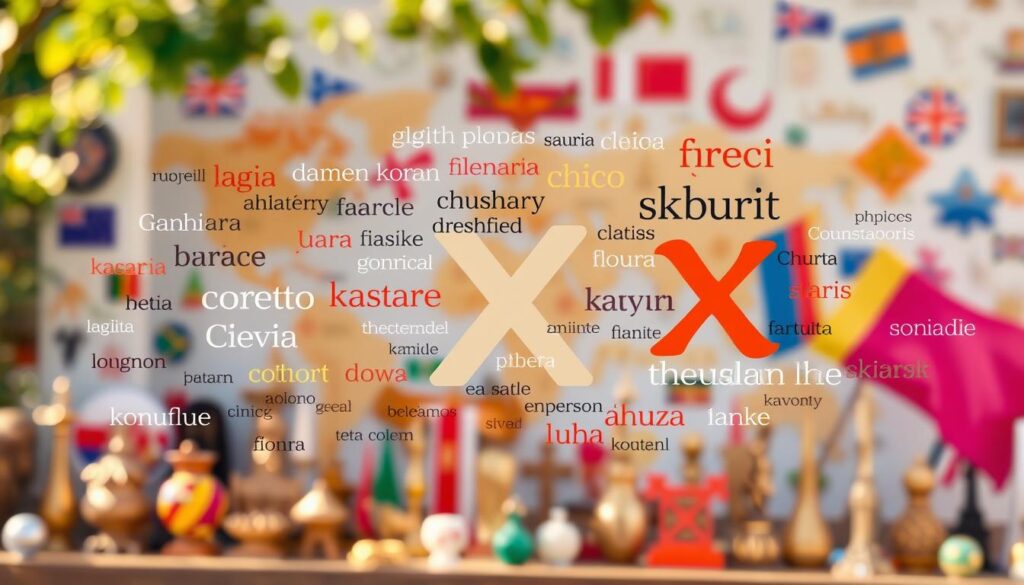Words With X
Unlock the secrets of words with x. Discover their intriguing histories, unique pronunciations, and fascinating linguistic insights.
The letter X is special in the English language. It shows up in only 0.15% of words, making words with X rare and interesting. This guide looks into vocabulary with X, covering their history, types, and uses in everyday talk and games like Scrabble.
Whether you’re getting better at words with X for contests or just to learn more, this guide explains their importance. Find out why X’s rarity brings both challenges and chances for writers, puzzle fans, and language learners. Explore the world of X-driven vocabulary and discover its hidden strength.
Understanding the Rarity and Value of Words With X
The letter X is very rare in English, appearing in less than 0.1% of words. It’s the third least common letter, after Z and Q. This makes words with X special.
English words with X have unique meanings. They range from scientific terms like “xenon” to everyday phrases like “box.”
In Scrabble, X tiles score 8 points because they’re so rare. Words like “xylophone” or “exquisite” get noticed. Their rarity makes them valuable in word games and creative writing.
X sounds like “ks” or “gz,” adding complexity. Many words with X come from Greek or Latin. This makes them less common in everyday speech. Their uniqueness helps in learning vocabulary, adding depth to communication.
A Brief History of the Letter X in Language
The letter X comes from ancient scripts, like the Phoenician “samekh” from around 1000 BCE. It evolved into the Greek “chi” (Χ). Later, Latin adopted X to represent the “ks” sound. This evolution laid the groundwork for x letter words in English today.
Early English didn’t use X much until Latin and Greek words like “exit” and “luxury” were added. By the Middle Ages, French words after the Norman Conquest brought more terms, like “exist.” This increased the x vocabulary words in English. Over time, X marked foreign or technical terms.
| Era | Letter Form | Language | Key Contributions |
| Phoenician | Samekh | Phoenician | Introduced X’s basic form |
| Greek | Chi (Χ) | Greek | Assigned the /ks/ sound |
| Latin | X | Latin | Used for “x” as in “maximus” |
| Modern English | X | English | Adopted through science, math, and global influences |
Today, finding x words in English shows their global roots. Terms like “x-ray” and “x-factor” in math connect ancient symbols to modern use. Learning about this history uncovers the stories behind discovering x words and their importance in language.

Words Starting With X: Beginning With the Extraordinary
English has fewer than 200 words starting with x. They are rare in language. Many come from Greek or Latin, like xenon, named from “xenos” (stranger).
Others, like x-ray, come from science. Xylophone is a musical instrument with wooden bars. These words often need clear pronunciation.
Xenophobia (zen-uh-FOH-bee-uh) means fear of foreigners. It comes from Greek “xenos” (foreign) and “phobos” (fear).
Medical terms like xerosis (dry skin) and xerophyte (drought-resistant plants) are common in science. Shorter terms like x-factor or x-axis are used daily. Knowing their origins helps remember them.
Xenograft combines Greek “xenos” (foreign) with “graft.” Using xenial (hospitality customs) adds detail in cultural talks. Learning words beginning with x enriches vocabulary and respects their unique roles in global communication.
Words Ending With X: Fascinating Conclusions
Words ending with X have unique spellings and origins. Suffixes like -ax, -ex, -ix, -ox, and -ux shape their meanings and sounds. Terms like “tax” and “crux” show their roots.
| Suffix | Example | Plural |
| -ax | tax, fax | taxes, faxes |
| -ex | complex, index | complexes, indices |
| -ix | mix, fix | mixes, fixes |
| -ox | box, fox | boxes, foxes |
| -ux | flux, crux | fluxes, cruxes |
Most X-ending words become plurals by adding -es. But, some like “indices” are used instead of “indexes.” Many come from Latin, like “complex” from Latin “complexus.”
Words like “box” are different from technical terms like “crux.” They can be nouns or verbs, like “fix” meaning both a repair and the act of repairing.
Looking up x words online or in dictionaries reveals their patterns. This exploration deepens our understanding of English’s rich layers.
Words With X in the Middle: Hidden Treasures
Words with x in the middle are full of surprises. They have x between vowels or consonants, making unique sounds. For example, “example” and “textbook” both have x with e. On the other hand, “maximize” pairs x with a.
The way we say these words can vary. “Oxygen” sounds like it has a z, but “complex” sounds like ks. Phrases like “sixth” or “mixture” show how common these words are in our daily talk.
Looking for x word examples shows interesting patterns. Words like “context” and “document” have the “-x-t-” pattern. Learning about roots like “-tax-” (taxonomy) or “-fix-” (refix) helps us understand more words.
Even compound words like “blackbox” have x in them. Knowing these patterns helps us figure out new words.
Language learners can improve by finding x in familiar words. Words like “exist,” “exhibit,” or “extra” are everywhere. By exploring these patterns, we can turn everyday speech into a fun x word search. Each example shows how x adds special meanings and sounds.

Short Words With X: Compact Power
Short words with X pack a big punch. Terms like box and lynx show how small words can make language more flexible. They often act as both nouns and verbs, making communication quicker.
Three-letter words with X include box (a container) and fix (to repair). These words are versatile. Lax means loose, and mix combines actions and outcomes.
Four-letter words with X like axle (wheel support) or exam (test) bring clarity. Taxi refers to vehicles and the act of hailing one. Exit guides movement or describes a door, showing its dual use.
Scrabble players love these words. Next scores points and shows order. Xyst (a garden path) is rare. Saying X as “ks” helps with clarity, like in lynx (linkss). These words create phrases like “taxi ride” or “mix tape,” showing that short words can be powerful.
Long and Impressive Words With X
Long words with x bring precision to specific fields. Words like xenotransplantation are key in medicine. It’s the act of moving organs from one species to another. This term, pronounced “zen-oh-trans-plant-AY-shun,” comes from Greek words for “foreign” and “transplant.”
Unusual words with x are perfect for specific areas. Xanthophyll (zan-THO-fil) talks about yellow plant pigments. On the other hand, xerographically (zer-oh-graf-ee-klee) is about dry printing. These words show how prefixes like “xero-” (dry) or “xantho-” (yellow) create complex vocabulary.
In art, xylopyrography (zy-loh-py-roh-grah-fee) is about burning designs on wood. Knowing its Greek roots, “xyl-” (wood), helps understand its meaning. Mastering these words makes technical writing more effective without being too formal.
Learning word roots and practicing their use is key. Remembering terms like xenotransplantation or xerography boosts your brain’s flexibility. These words help in clear communication when used wisely.

Scrabble and Word Games: Strategic Use of X Words
Learning Scrabble words with x can make the X tile a game-changer. In Scrabble, the X tile is worth 8 points, one of the highest. Players who know an x words list or use an x words dictionary can score big. Words like “ax” or “xi” can be very powerful when placed right.
Where you place the X tile matters a lot. Put it on double or triple letter squares to increase its score. Words like “max” or “exit” can create multiple words at once. The official Scrabble dictionary has rare terms like “xu” or “xenon” that can surprise opponents.
Knowing an x word list helps find these gems fast. It’s also important to block spaces where opponents might use their X tiles. Use online tools or apps to practice making high-scoring words. Mastering X words can turn the game around, getting you points and beating your opponents.
Words With Both X and Z: The Rarest Combinations
Words with both X and Z are very rare. Examples include “xenozoa” and “xanthoprotein.” These rare x words mix two uncommon letters. They often come from science or tech, combining Greek roots with fields like biology or chemistry.
Terms like xenozoon (a parasite from foreign hosts) or xylozanthin (a plant pigment) show how unique words with x meet specific naming needs. Pronouncing them can be tricky, requiring careful study to avoid confusion.
For those who love word games, finding words with x and z can be a strategic move. In Scrabble, these rare words can earn high scores. Words like “zax,” a tool for cutting roofing slate, or “xenizine” (a chemical compound) are examples of uncommon words with x. They connect everyday use with academic fields.
Looking into these hybrids shows how language grows to cover new ideas, even when it’s hard to spell. Learning these terms can give you both knowledge and a competitive edge.
Foreign Words With X Adopted Into English
English gets richer with borrowed words. Many common words with x come from other cultures. For example, French gave us *faux* (false) and *bureaux* (offices). These words show how X fits into English sounds.
Spanish loanwords like *Mexico* and *Texas* tell us about their origins. Portuguese *xuxa* (a type of Brazilian dance) adds cultural depth. Greek terms like *xenia* (hospitality) and *xenon* (a chemical element) show scientific and philosophical influences.
Non-European languages also add to English. Chinese *xiao* (a flute) and *xiaolin* (small forest) bring Eastern traditions into English. Arabic *xerif* (sheriff) shows how spellings can change, replacing “sh” sounds with X. Indigenous terms like *xocolatl* (chocolate’s Nahuatl root) show historical exchanges.
These x words in English often keep their original spellings but change how we say them. Some words, like *xerif*, replaced older spellings. Greek *x* often means *ks* sounds, as in *xeros* (dry), now *xerosis* in science.
Today, globalization keeps adding new x words to English. Looking into these borrowed terms shows how English grows through global connections. It adds cross-cultural stories to its x-based vocabulary.
Unique and Unusual Words With X for Vocabulary Enhancement
Expand your vocabulary with unique words that spark curiosity. Words like “xertz” (to gulp swiftly) or “xenization” (traveling as an outsider) mix history with usefulness. They come from Greek (“xanthic” for yellowish tones) to modern slang, adding precision to specific topics.
Think about “xyresic” for razor-sharp edges or “xyst” for a Greek courtyard. Each term fits a specific context. Use “xanthic” in science writing and “xenization” in travel stories. Grouping them by theme helps you remember them better.
Learning these words requires balance. Use “xertz” in everyday talks but save “xyresic” for technical reports. Create flashcards or link “xanthic” to “X marks the yellow” to improve memory. These words enrich your language without confusing others. Enhance your communication with these unique terms!

Conclusion: Embracing the Exceptional World of X Words
Words with X are special in English, mixing rarity with great power. They have ancient roots and play a big role in Scrabble. To learn more, start by searching for x words in dictionaries or online.
Try using exploring x words in your writing or debates. This will help you get better at using them.
Use tools like x words list or apps like Anki or Quizlet for learning. Play Scrabble games like Words with Friends to get better at using these words. These tools make rare words a part of your daily talk.
Language keeps changing, and X stays important. Whether you’re solving crosswords or writing essays, these words add something special. Keep looking up new words and their meanings.
FAQS: Words With X
What are some examples of common words with X?
Words with X include “example,” “ax,” and “box.” Also, “taxi” and “x-ray” are common. These words are used in many ways, making them useful in writing and talking.
Are there any 3-letter words that contain X?
Yes, there are. “Fox,” “box,” “wax,” “mix,” and “lax” are all 3-letter words with X. They are great for word games like Scrabble.
How can I find words with X in the middle?
Look for words with “-ex-,” “-ax-,” and “-ox-.” These patterns are common in many words. They fit well into everyday language.
Why are words with X and Z so rare?
X and Z are rare letters in English. This makes words like “xenophobia” and “xylophonist” unique. They are mostly found in technical or specialized areas.
Can you provide a list of words starting with X?
Sure! Words starting with X include “x-axis,” “xenon,” and “xenophobia.” Also, “xylophone” and “xerography” are on the list. Each has its own meaning and use.
What are some unique and unusual words with X?
Words like “xertz” (to gulp down quickly) and “xenization” (traveling as a stranger) are unique. “Xyresic” (razor-sharp) is another. Using these words can add interest to your vocabulary.















